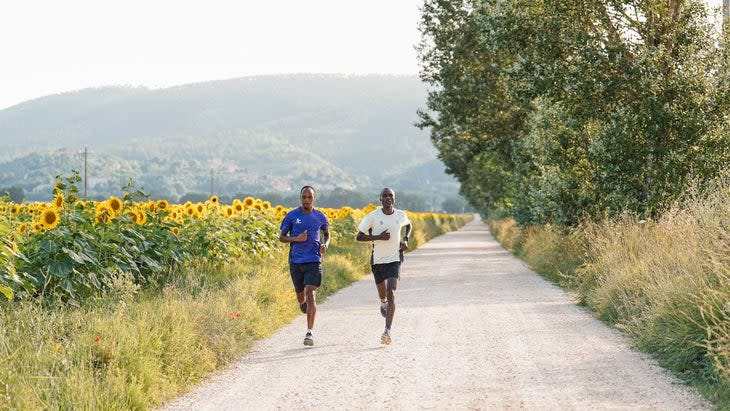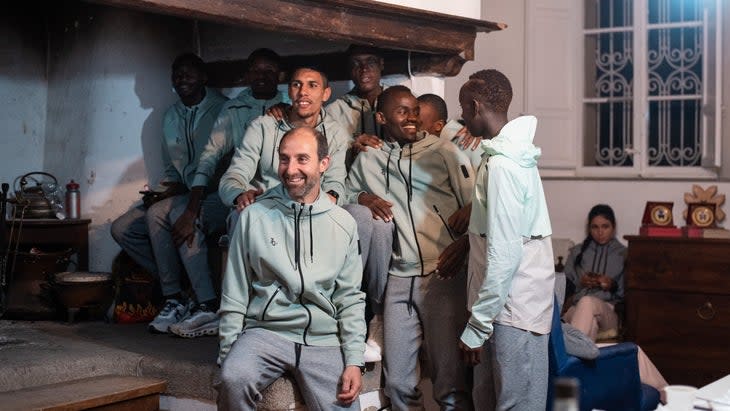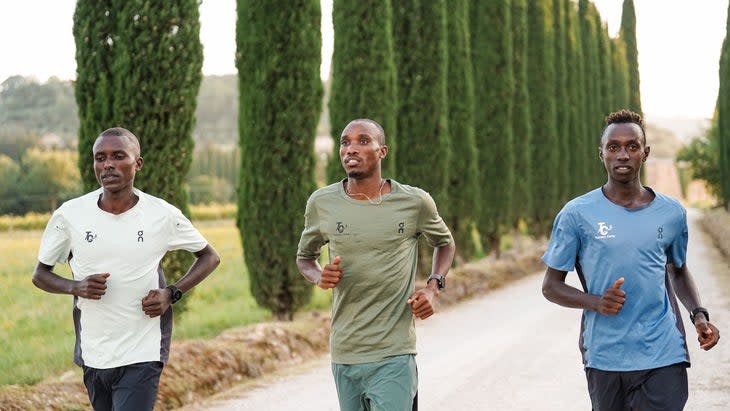This Elite Running Camp in Tuscany Is a Dream
This article originally appeared on Outside
Yohanes Chiappinelli, 26, sits on a wooden bench alongside five other international runners inside a small church in the countryside. Soft orange light gleams outside the entrance on this Tuesday evening in Tuscany. The Ethiopian-born Italian marathoner, currently the fourth-fastest in the country, is dressed in blue jeans, a grey hoodie and running shoes. He quietly waits during the golden hour as a priest lights candles at an altar. These athletes are here for a benediction 11 days before the start of the World Athletics Championships.
Italian coach Giuseppe Giambrone likes his runners to be blessed before important competitions. He is a man so religious that he crosses himself to acknowledge God's presence multiple times a day, especially when he drives by a church. Once, Giambrone brought a few of his athletes to Rome, where they met Pope Francis during a private service.
Three dozen people file inside for the ceremony. Giambrone's hand shakes as he holds a piece of paper scribbled with blue ink and begins to read out loud. "Ai ragazzi che parteciperanno ai mondiali di atletica leggera a Budapest..." (To the boys who will participate in the World Athletics Championships in Budapest) I am very proud of you. I would like to offer a prayer in the hope that they can have a great race and be victorious." Tears stream down his cheeks as everyone claps.
RELATED: WTF Is the World Athletics Championships and Why Should I Care?
The athletes he is referring to--Ugandan Oscar Chelimo, Burundians Egide Ntakarutimana, Francine Niyomukunzi, Onesphore Nzikwinkunda, Olivier Irabaruta, Amin Mohamed Jhinaoui of Tunisia, and Chiappinelli--are top professional distance runners who live full-time in the heart of Tuscany. For the past several months, they've been preparing to compete in various events, ranging from the 3,000-meter steeplechase to the marathon, at the 19th edition of the World Athletics Championships, which are currently underway as of August 19 and conclude on Sunday, August 27.
The environment they live in is full of lush rolling hills and unpaved white roads made of crushed limestone (referred to as strade bianche) that weave around sunflower fields, Sangiovese vineyards, meadows, and medieval churches.

Come run, and you'll encounter a dozen routes exceeding the distance of a half marathon, a fluctuation of flat paths and steep inclines, sometimes smooth or else rocky. The terrain is "good for proprioception," Giambrone says. In other words, it's a sensory experience that promotes body awareness. For speed work, athletes train on a dirt track nearby or on a synthetic version in Siena, a 20-minute drive away.
In the countryside, there's little else to do besides eat, sleep, and run--typical of elite training camps. But unlike other elite camps, which are often located at an altitude exceeding 5,000 feet and focus more so on perfecting biomechanics and improving individual race performance, Tuscany Camp is a marriage of expert coaching in an environment that promotes camaraderie as much as it does training and recovery.
Though the elevation in San Rocco hardly tips 800 feet, one reason Giambrone founded Tuscany Camp in this region is due to its environmental conditions. Summer temperatures are often upwards of 100 degrees Fahrenheit in San Rocco, cruel though advantageous on the body. Research suggests that heat training can offer benefits of running at high altitude.
An Incubator for Elite Performance
At any given time, Tuscany Camp hosts elite athletes from all over the world. In years past, that has included South African Olympic champion sprinter Caster Semenya, the Chinese Olympic Team, and high-level runners from Japan. Earlier this year, several runners from the World Athletics Athlete Refugee Team--comprising athletes that have fled conflict, violence, and injustice in their home countries--used Tuscany Camp as a training base for two months in preparation for competitions.

Currently, there are 21 professional runners from Italy, Tunisia, Uganda, and Burundi that live on-site the majority of the year and are sponsored by On, an athletic shoe and performance sportswear company headquartered in Zurich. The On-sponsored elites live, train, and eat alongside other high-level runners that visit the camp.
The athletes live in a 18th-century restored classical Tuscan villa that was originally built for the Borghesi Bichi, a noble family with close ties to the Vatican. Later, it was home to Alessandro Sanminiatelli Zabarella before he was appointed as Cardinal in 1899 by Pope Leo XIII.
A Dream Realized
Laura Neri, a descendant of the Borghesi Bichi family, now owns the 20-bedroom property, which also includes two apartments. She had been following Tuscany Camp on social media when Giambrone reached out. For years, he bounced around the village training a few Ugandan athletes that lived in a small hotel room with twin-sized beds.
Giambrone paid out of pocket for eight years to keep the camp afloat. Meanwhile, he sought support from major athletic brands, but none were interested. Later, when he wanted to bring in more athletes to coach, his real estate search for a larger space led to dead-ends. Property owners didn't want to rent a house for African athletes, Giambrone says, until Neri's offer. She agreed to lease at a moderate monthly rate.
At the time, the property was mostly empty, and a couple of rooms were overgrown with plants and infested with mice. Giambrone hand renovated some areas during the pandemic. In January 2022, On became the main sponsor. "No big company believed in me until partnering with On," Giambrone says.

A training camp had been Giambrone's dream since he was a teen growing up in Sicily. Giambrone's first brush with coaching began when he was asked at age 12 to help mentor a youth running team at his church. A mid-distance athlete during his childhood, Giambrone stopped competing due to health problems. Instead of leaving the sport completely, he studied it closely, eventually earning a technical coaching license, certified by the Italian Athletics Federation. Years later, in January 2014, he traveled to Uganda in search of developing talent, and, in collaboration with the Uganda Athletics Federation, he began his training camp in Tuscany and recruited promising runners.
Giambrone would go on to mentor 50 runners into elites (including eight Olympians) that have collectively amassed 22 international medals and set seven national records for their home countries. He also coached Olympic bronze medalist Jacob Kiplimo of Uganda to a world record (Kiplimo ran 57:31 at the 2021 Lisbon Half Marathon). Kiplimo's younger brother Oscar, a 5,000-meter bronze medalist at last year's world championships, is a resident at Tuscany Camp. He will again compete in 5,000 meters at the world championships, the first round of which is scheduled on August 24, day six of competition.
Without the financial means to build a new facility, renting the villa as the training base was a miracle, Giambrone says. The athletes certainly don't complain about their ancient abode, the interior of which features marble accents, parquet wood floors and hand-painted ceilings.
The property is equipped to support a runner's every need: an indoor and outdoor pool; a cold-water immersion tub; a sauna, and a massage room with a Tecar therapy machine and cryoultrasound. There are also two gyms, one of which is housed in a former wine cellar..
Preparing for the World Stage
Ten days out from the start of the World Athletics Championships, the kitchen bustles at 7:15 AM with a half-dozen runners making shots of espresso. The nutty aroma of freshly ground coffee beans perfumes the room as demitasse cups fill under a De'Longhi machine.
Chiappinelli drizzles olive oil on a small piece of bread layered with peanut butter. He adds a few drops of liquid vitamin D and eats it. Chiappinelli is being cautious of his nutrition as he heads into his second marathon on August 27, the final day of competition at the world championships.

The race will be his third appearance at the most prestigious athletics competition outside of the Olympic Games (he competed in 2017 and 2019 in the steeplechase on both occasions). Chiappinelli debuted in the marathon in February in Seville, clocking 2:09:46. He is aiming for a top-10 finish in Budapest.
Within the hour, Giambrone parks a nine-passenger Ford Transit into a wheat field. He steps onto a cornerless, flat road adjacent to wildflowers and blackberry bushes, and waits for five runners in the men's distance group. The speed session calls for 15 x 1,000 meters. Any shade on the road is gone, and there is no breeze to puncture the humid, 80-degree air by the time the group arrives at 9:11 A.M.
RELATED: Is This the Hippest Running Store in the World?
Chiappinelli finishes a three-mile warmup alongside Emanuel Ghergut, 27, a top-ranked middle-distance runner and regional champion in the 5,000-meter, from Florence, who has joined the camp for two weeks. He will attempt to keep up alongside Chiappinelli as well as three-time Olympian Olivier Irabaruta and Onesphore Nzikwinkunda. The latter two will represent Burundi in the marathon in Budapest.
When they arrive, Giambrone briefs the workout before the men line up single file on the side of the road. Giambrone clicks a stopwatch, and the athletes catapult into sprinting as he scrambles back into the van and punches the gas pedal with his foot. Their speed looks as though they are competing with each other, but really they are working together. Each runner will take turns at the front. Though these men represent three countries, all are here to help each other level up.
One hand on the steering wheel, the other gripping a stopwatch, Giambrone shouts, "Ale! Ale!" Come on! Their pace is the equivalent of a sub-4:40 minute mile, and they will maintain it throughout the workout. Ghergut drops behind by a few seconds just three reps into the session. Sweat glitters on his forehead. His clothes cling to his body like a second skin. He will continue in the back for the remaining reps--and not on purpose. By rep seven, he can barely catch his breath as he chugs from a water bottle.
"I'm only human," he says. The gap between Ghergut and the others will expand to nine seconds. Watching in person looks as though they are performing two different workouts.
"The boys are crazy horses," Ghergut says. Despite the challenge of keeping up with elites during each training session, he appreciates learning from their ways, especially how they take care of themselves. "They never underestimate recovery."
Though Ghergut is a member of an amateur team, Toscana Atletica Jolly, he trains mostly alone in Florence because, as he explains, there aren't many others of his caliber in the city. "Teamwork always pays off," Ghergut says. "I've come to the right place."

Synergy is what Giambrone aims to cultivate as runners like Ghergut pass through the training camp. That, in fact, is a core philosophy at Tuscany Camp. Everyone is focused on winning, but the idea is to be united while working toward individual goals.
Ghergut finishes his workout after 10 reps. "I'm definitely dead," he says, gasping for air as he waits for the others, who continue with five more reps. "But I'm so happy."
Chiappinelli is finally done with the morning workout after running 1,000 meters 15 times. The athletes bump fists as Giambrone shouts from afar, "Milk! Drink the milk!" Chiappinelli packed a recovery beverage: 12-ounces of skim milk with two teaspoons of white sugar and a pinch of salt. The elites usually drink the mixture from a sports bottle within three minutes of a tough workout like today, as part of their recovery routine.
He grabs the bottle as the guys pile into the van, their workout clothes dripping. The athletes will shower quickly and put on their swim trunks. A recovery bath is in order in Monticiano, 14 miles away.
At least twice a month, athletes at Tuscany Camp retreat to the Petriolo thermal baths and lay in mineral-rich pools. Part of the water is cold enough to raise goosebumps while another area makes your skin feel like it's cooking in 109-degree soup. It's a natural version of contrast therapy, a technique used to improve blood circulation in the body--and they'll need this recovery ahead of a second training session in the afternoon.
Later, they will share conversation over plates of herb baked chicken and pesto fusilli. When their stomachs are full and they turn down for the evening, they'll sign off the night "buona notte" to each other before they wake up and do it all over again.
For exclusive access to all of our fitness, gear, adventure, and travel stories, plus discounts on trips, events, and gear, sign up for Outside+ today.

